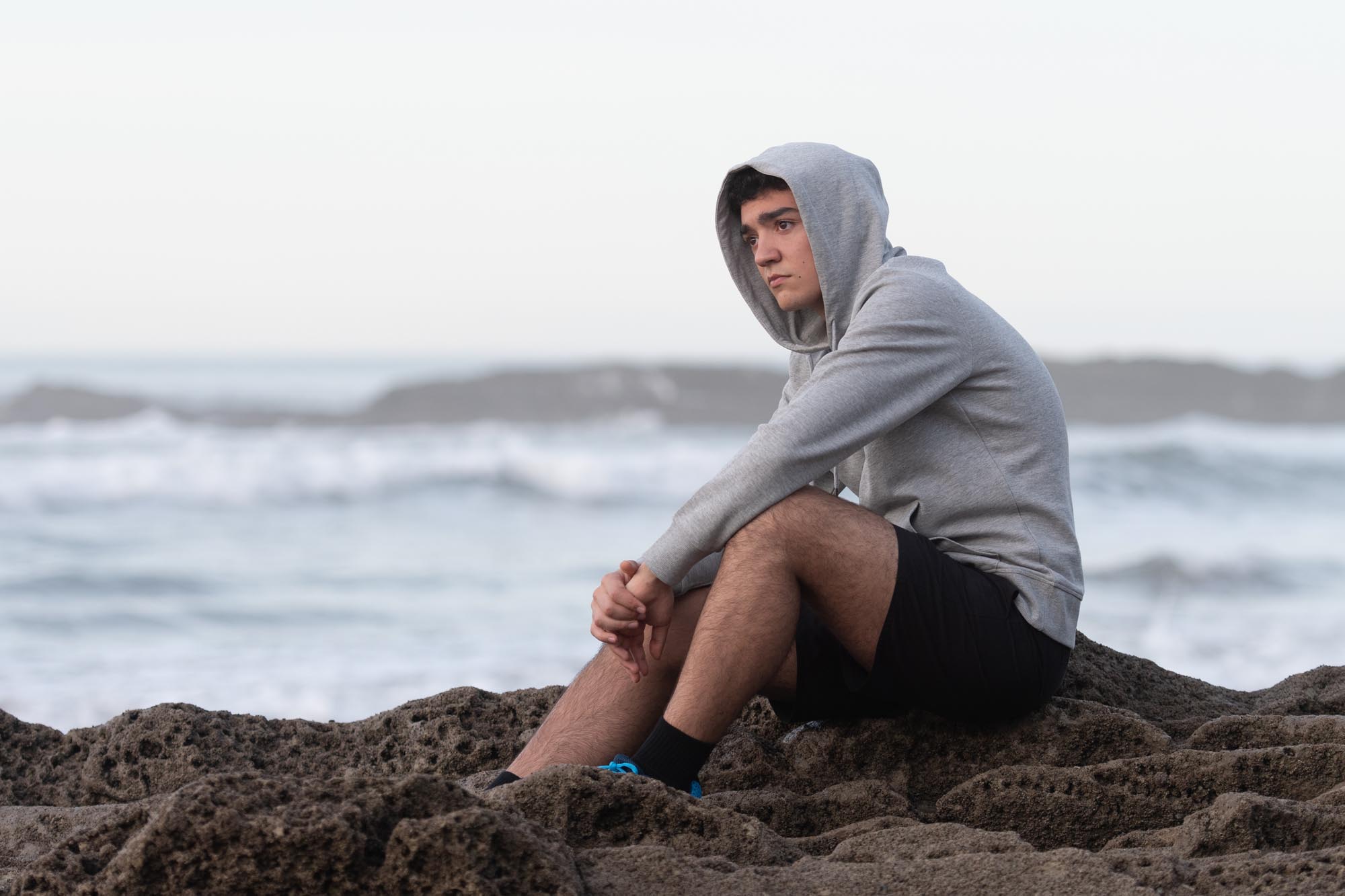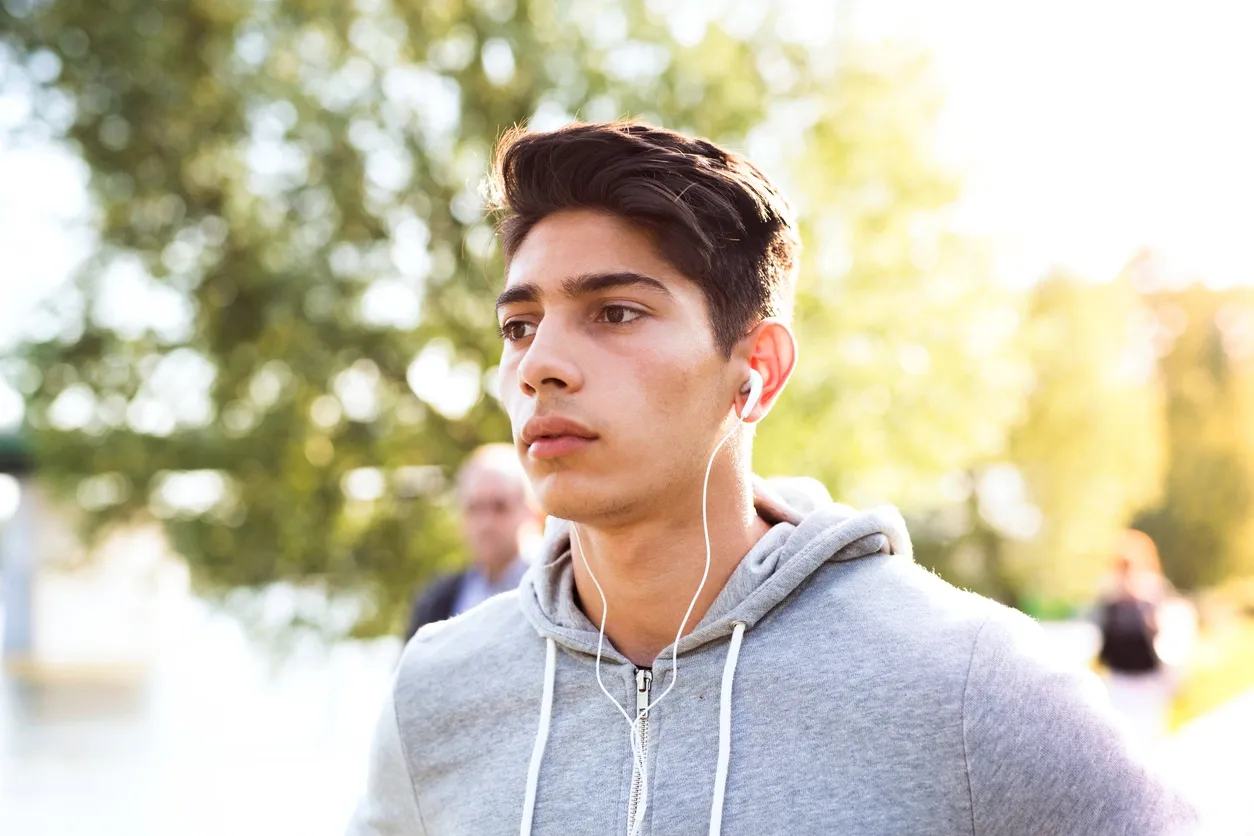Understanding Anxiety in Teens
If you’ve noticed your teenager seems more stressed than usual, you’re not alone in your concern. Anxiety in teens has become increasingly common, with recent studies showing that nearly 1 in 3 adolescents in the U.S. will experience an anxiety disorder before reaching adulthood. That’s a staggering number, and it means many parents are navigating these same worries right alongside you.
How Anxiety in Teens Differ from Child Anxiety
Adolescent anxiety looks different from what you might see in younger children. While a seven-year-old might cling to your leg or cry openly about their fears, teenagers often mask their anxiety behind closed bedroom doors, irritability, or what might seem like typical teenage moodiness. Their developing brains are processing complex social dynamics, academic pressures, and identity questions all at once, making anxiety feel particularly overwhelming during these years.
Types of Anxiety in Teens
The types of anxiety your teen faces are uniquely tied to their developmental stage:
- Social anxiety — intense fear of judgment or embarrassment in social situations, often amplified by social media
- Test anxiety — overwhelming stress about academic performance that can lead to physical symptoms or avoidance
- Body image concerns — persistent worry about appearance that can interfere with daily activities and self-worth
Understanding these patterns is the first step in recognizing when your teen needs support. If you’re dealing with Anxiety in teens & Panic Attacks, our skilled staff and specialized program at Build Bright Care Group can help. We offer a variety of proven, evidence-based treatments specifically designed to work for your teen’s unique needs.
As a parent, you may wonder how you can help your teen cope with this anxiety. It’s important to remember that support is crucial during this challenging time.
Early Warning Signs of Anxiety in Teens
Recognizing emotional distress in adolescents starts with knowing what to watch for. Anxiety doesn’t always announce itself clearly—it often hides behind behaviors that might seem like typical teenage moodiness or growing pains. The key is noticing when these patterns become persistent or intense enough to disrupt your teen’s daily life.
1. Behavioral changes
Behavioral changes often appear first. Your once-social teen might start declining invitations to hang out with friends, making excuses to stay home from school, or suddenly dropping activities they used to love. They may retreat to their room more often, seeming to pull away from the family connections that once felt natural.
2. Physical symptoms
Physical symptoms can be surprisingly common with anxiety. Your teen might complain of frequent headaches, stomachaches that have no medical explanation, or constant fatigue even after a full night’s sleep. You might notice them rubbing their neck or shoulders due to muscle tension, or struggling with sleep—either having trouble falling asleep, staying asleep, or sleeping far more than usual.
3. Emotional indicators
What Parents Need to Look Out For
Emotional indicators reveal what’s happening beneath the surface. Watch for increased irritability that seems out of proportion to the situation, restlessness that makes it hard for them to sit still, or difficulty focusing on homework or conversations. Changes in appetite—eating significantly more or less than usual—can also signal that anxiety is taking hold.
Beyond the day-to-day signs, certain red flags deserve your immediate attention when it comes to anxiety in teens. These indicators often signal that your teen’s anxiety has escalated beyond typical stress.
1. Sudden shifts in mood and behavior
These can reveal deeper emotional distress. You might notice your once-cheerful teen becoming consistently irritable, snapping at family members without apparent reason, or displaying emotional reactions that seem disproportionate to the situation. These aren’t just “teenage mood swings”—they’re often your child’s way of expressing internal turmoil they can’t quite articulate.
2. Panic attacks
These present unmistakable physical symptoms that can be frightening for both you and your teen:
- Racing or pounding heartbeat
- Profuse sweating or chills
- Dizziness or feeling faint
- Chest tightness or pain
- Sensation of choking or difficulty breathing
- Tingling or numbness in hands
When anxiety becomes unbearable, teens sometimes turn to unhealthy coping mechanisms. Watch for signs of substance experimentation, persistent school refusal, self-harm behaviors, or extreme isolation. These actions aren’t defiance—they’re desperate attempts to manage overwhelming feelings.
3. Environmental pressures
These amplify anxiety significantly. Bullying (whether in-person or online), relentless academic expectations, toxic social media comparisons, and friendship conflicts create a perfect storm of stress. Adolescent anxiety support becomes essential when these external factors compound internal struggles, making it difficult for your teen to navigate daily life.
Supporting Your Anxious Teen at Home
Supporting anxious teen behaviors starts with creating an environment where your child feels safe expressing what’s really going on inside. When your teen opens up about their worries, resist the urge to immediately fix the problem or minimize their feelings. Sometimes they just need to know you’re listening without judgment. Try saying things like “That sounds really hard” or “I’m here for you” rather than jumping straight to solutions.
Practical tools for adolescent mental health support at home:
- Teach grounding techniques – Help your teen practice the 5-4-3-2-1 method (naming 5 things they see, 4 they can touch, 3 they hear, 2 they smell, 1 they taste) when anxiety spikes
- Practice breathing together – Box breathing (inhale for 4, hold for 4, exhale for 4, hold for 4) can calm the nervous system during stressful moments
- Create a calm-down kit – Fill a box with sensory items like stress balls, essential oils, or calming music playlists
- Incorporate self-regulation tools – Explore various self-regulation tools that can help your teen manage their emotions better
Your own reactions to stress teach powerful lessons. When you’re stuck in traffic or facing a work deadline, narrate how you’re managing those feelings: “I’m feeling stressed right now, so I’m taking some deep breaths.” This shows them that anxiety in teens and adults is normal and manageable.
Structure provides security. Consistent bedtimes, regular meals with protein and whole foods, and daily movement (even a 15-minute walk) create stability that helps regulate anxious feelings. These routines become anchors when everything else feels uncertain.
When to Seek Professional Help for Anxiety in Teens
You’ve been doing everything right at home—creating space for conversation, encouraging healthy habits, being present. But sometimes, despite your best efforts, anxiety continues to grow stronger. Knowing when to reach out for professional help for teen anxiety can feel overwhelming, but trust your instincts. If your teen’s anxiety is keeping them from living their life, it’s time to consider additional support.
Watch for these signs that early intervention for adolescent anxiety is needed:
- Your teen consistently misses school or avoids activities they once enjoyed
- Anxiety symptoms persist for several weeks without improvement
- Their grades are dropping or friendships are suffering
- They’re experiencing frequent panic attacks or intense physical symptoms
- You notice self-harm behaviors or talk of hopelessness
Cognitive behavioral therapy (CBT) has proven remarkably effective for teen anxiety. This evidence-based approach helps adolescents identify anxious thoughts, challenge them, and develop practical coping skills. Many teens respond well to both in-person sessions and online counseling options, which can feel less intimidating for those hesitant about traditional therapy.
In some cases, a psychiatrist may recommend selective serotonin reuptake inhibitors (SSRIs) alongside therapy. While medication isn’t always necessary, it can provide crucial relief for teens with severe anxiety, allowing them to engage more fully in therapeutic work and daily life.
Taking the Next Step: Supporting Your Teen’s Mental Health Journey
You’ve learned the signs. You’ve started the conversations. Now comes the part that takes real courage: reaching out for help.
Recognizing anxiety in teens early and acting on what you see can change the entire trajectory of your child’s mental health. You don’t have to wait until things feel unbearable. Local teen counseling programs and specialized adolescent anxiety support resources exist precisely for moments like these.
If your teen’s anxiety is affecting their daily life, school performance, or relationships, connecting with local teen mental health care professionals who truly understand adolescent development makes all the difference. Build Bright Care Group teen mental health programs offer comprehensive, evidence-based treatment in a residential setting that feels like home—not an institution.
Ready to explore what compassionate, specialized care looks like for your family? Contact Build Bright Care Group to learn more about our Build Bright Care Group teen programs and how we support California families through their teen’s mental health journey.
FAQs (Frequently Asked Questions)
What are common signs of anxiety in teens that parents should watch for?
Parents should look out for behavioral signs such as withdrawal from family and friends, avoidance of social situations or school, physical symptoms like headaches, stomachaches, muscle tension, fatigue, and sleep disturbances. Emotional indicators include irritability, restlessness, difficulty concentrating, and changes in appetite.
How does anxiety manifest differently in teenagers compared to younger children?
Anxiety in teens often presents through specific types such as social anxiety, test anxiety, and body image concerns. Unlike younger children, adolescents may experience more complex emotional distress influenced by peer pressure, academic expectations, and social media impacts.
What steps can parents take to support an anxious teen at home?
Supporting an anxious teen involves maintaining open and nonjudgmental communication about their emotions and struggles. Encouraging healthy coping strategies like relaxation techniques and breathing exercises, modeling calm responses to stress, promoting positive self-esteem through encouragement, and establishing healthy routines including good sleep hygiene, balanced nutrition, and regular exercise are essential.
When should parents seek professional help for their teen’s anxiety?
Professional help should be sought when anxiety symptoms interfere with daily functioning or learning. Effective treatments include cognitive behavioral therapy (CBT), counseling options both in-person and online, and in severe cases, medication such as selective serotonin reuptake inhibitors (SSRIs) may be considered under medical guidance.
What impact do environmental factors have on adolescent anxiety?
Environmental factors like bullying, academic pressure, and social media influences can significantly contribute to the development or worsening of anxiety in teens. Awareness of these factors is crucial for early intervention and support.
Where can parents find specialized support programs for teen anxiety?
Parents are encouraged to connect with specialized local teen counseling programs such as those offered by Build Bright Care Group. These programs provide comprehensive adolescent mental health support and guidance tailored to meet the unique needs of anxious teenagers.



